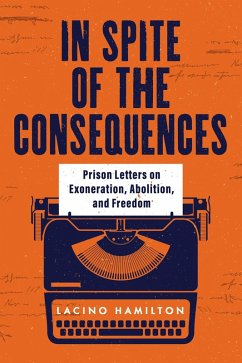Falsely convicted of murder and sentenced to life in prison, Lacino Hamilton sent thousands of letters during his incarceration. After twenty-six years, including eleven years in solitary confinement, and a years-long campaign of public and political pressure, Hamilton was exonerated and released on September 30, 2020. The letters he wrote during his incarceration, advocating for his innocence--literally writing for his life--made him a leading voice on issues of abolition, imprisonment, and justice. Despite fierce resistance and retaliation from prison officials, he maintained correspondence with family and friends, as well as university professors and activists.
Tireless, empathetic, and unflinching, Hamilton's voice throughout these letters shines with immediacy. We must engage all people in recognizing the terrible costs of maintaining the US system of justice, he writes. In his passionate critiques of the prison-industrial complex, his emotional appeals to friends and family, and his fierce and unflagging defense of his own innocence, Hamilton exposes the oppressive, humiliating, and destructive reality of our justice system. From divestment in cities and policing policies to the everyday violence of imprisonment and its attempts to obliterate personhood in favor of obedience, these letters offer an incisive critique of our criminal justice system. We also feel Hamilton's deep generosity of spirit as he counsels others affected by this terrible system and lauds the work of those working on the outside for reform. With his voice, we sense something unexpected and profound: hope for a reimagining of our systems--a humanity-affirming model of justice.
Dieser Download kann aus rechtlichen Gründen nur mit Rechnungsadresse in A, B, BG, CY, CZ, D, DK, EW, E, FIN, F, GR, HR, H, IRL, I, LT, L, LR, M, NL, PL, P, R, S, SLO, SK ausgeliefert werden.









